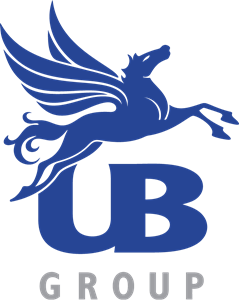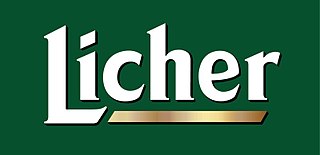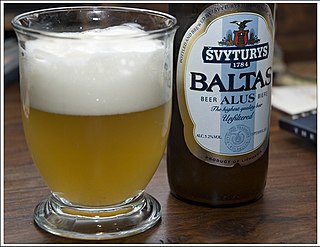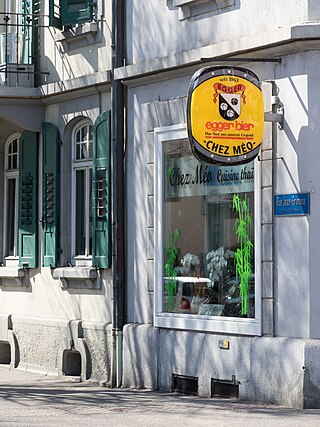
Holsten Brewery is a brewing company founded in 1879 in what is now Hamburg's Altona-Nord quarter. The group now has seven breweries in Germany. Its nationally distributed premium brand is the pale lager Holsten Pilsener. The company was acquired by the Carlsberg Group in 2004.

Gose is a warm fermented beer that originated in Goslar, Germany. It is usually brewed with at least 50% of the grain bill being malted wheat. Dominant flavours in gose include a lemon sourness, a herbal characteristic, and a strong saltiness. Gose beers typically do not have prominent hop bitterness, flavours, or aroma. The beers typically have a moderate alcohol content of 4 to 5% ABV.

Spaten-Franziskaner-Bräu GmbH is a brewery in Munich, Bavaria, Germany. It produces Spaten and Franziskaner beers.

König Brewery is a brewery situated in Beeck, a neighborhood of Duisburg, Germany that brews the well-known König Pilsener.

United Breweries Holdings Limited (UBHL), also called UB Group, is the Indian subsidiary of Heineken N.V.. Is headquartered in UB City, Bangalore, Karnataka. Its core business includes beverages and investments in various sectors. The company markets beer under the Kingfisher brand, and owns various other brands of alcoholic beverages. United Breweries is India's largest producer of beer.

Ottakringer is the last large brewery remaining in Vienna, Austria, and is located in Ottakring, the 16th district of Vienna.

The Kulmbach Brewery Corporation was founded in 1895 under the name Reichelbräu in Kulmbach, a city in Upper Franconia, Bavaria, Germany.

Sternburg is a brand of German beer, brewed and bottled by Radeberger Group. Their best selling product is "Sternburg Export". In 2006 it had 9.5% of the market share in Eastern Germany.

Licher is a brewery in Lich, Germany. With 250 employees, the brewery is the largest in Lich. "Licher Beer" has been market leader since 1988 in Hessen and is known to be one of the top 20 beers in the German beer market.

Baltic Beverages Holding is a brewing company owned by Carlsberg Group. It is a significant operator in the brewing industry in the Baltic states and Ukraine.

Piast Brewery is a defunct brewery, located in Wrocław, Poland. It was founded in 1872, when the city of Wrocław, known as Breslau, belonged to the German Empire.

Oettinger Brauerei is a brewery group in Germany. Oettinger was Germany's best selling beer brand between 2004 and 2013 with an annual output of 6.21 million hectolitres (5,290,000 US bbl) in 2011.
Brau und Brunnen AG was a German brewing and beverage group which was formed as "Dortmunder Union-Schultheiss Brauerei AG" in 1972 through a merger between Schultheiss-Brauerei and Dortmunder Union-Brauerei. It was renamed Brau und Brunnen in 1988. It owned a number of formerly independent breweries, including Einbecker Brewery. Until the early 1990s, Brau und Brunnen was the largest beverage company in Germany, but its market share steadily declined throughout the 1990s. An additional cause for the decline was the company's purchase of Bavaria – St. Pauli Brewery and Jever for an estimated 800 million DM, although these purchases were later estimated to only be worth closer to 250 million DM. Other companies engaged in a series of mergers and acquisitions, and by 1999, it had sunk to the fourth-largest beverage company and was continually losing money. After unsuccessful internal reorganizations, the company was purchased by Dr. August Oetker KG and integrated into its subsidiary Radeberger Gruppe.

Brauerei Diebels is a firm based in Issum on the Lower Rhine that manufactures various beer products. The company was a prominent shirt sponsor of Borussia Mönchengladbach during the 1990s.
Radeberger Group is the largest brewery group in Germany. It is headquartered in Frankfurt am Main and produces beer at 16 different locations. With an approximate annual production volume of 13 million hectolitres, the group accounts for approximately 15% of German beer production.

The Brauerei Fohrenburg is a brewery in Bludenz in Vorarlberg (Austria). It was established by Ferdinand Gassner in 1881.

The Aldersbach brewery is a traditional medium-sized brewery in Aldersbach, Lower Bavaria, opened in the 13th century. It produces beer types such as Dunkel, Helles, and Pilsner, plus seasonal Bock and Pale lagers. In 2016, it won awards from the Bavarian Brewers Association and the Bavarian State Beer Exhibition.

Switzerland has a long tradition of brewing, with significant domestic beer production and a growing craft brewing sector.

Spatenbräu is a brewery in Munich, Germany, with a history going back to 1397. Since 1922, the brewery has been part of Spaten-Franziskaner-Bräu GmbH, which has itself been part of the Spaten-Franziskaner-Bräu group since 1997. It is now owned by the Anheuser-Busch-InBev brewery group. The beer writer Michael Jackson considered the Spaten brewery as the most significant brewery in the history of lager beer because of its innovations in the 19th century.

The Zipf Brewery is a brewery in the Upper Austrian municipality of Neukirchen an der Vöckla. It is named after its location in the Zipf division and is part of Brau Union Österreich AG, the majority of whose shares are owned by Heineken.


















